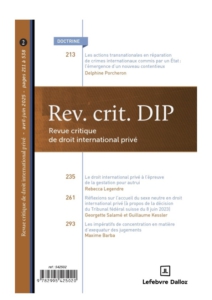Revue Critique de droit international privé – Issue 2025/2
 Written by Hadrien Pauchard (assistant researcher and doctoral student at Sciences Po Law School)
Written by Hadrien Pauchard (assistant researcher and doctoral student at Sciences Po Law School)
The second issue of the Revue Critique de droit international privé of 2025 has just been released. It contains four articles, seven case notes and numerous book reviews. In line with the Revue Critique’s recent policy, the doctrinal part will soon be made available in English on the editor’s website (for registered users and institutions).
The issue opens with Dr. Delphine Porcheron’s (Université de Strasbourg) in-depth study of Les actions transnationales en réparation de crimes internationaux commis par un État : l’émergence d’un nouveau contentieux (Transnational reparation claims for international crimes committed by States: the emergence of a new form of litigation). At the crossroads of public and private international law, the contribution discusses the lessons learned from emblematic cases rendered across multiple jurisdictions. Its abstract reads as follows:
In light of the limited availability of international judicial remedies for individuals and the inadequacy of existing compensation schemes, victims of international crimes attributable to a State increasingly seek redress through domestic courts. These transnational claims for reparation are on the rise and have generated a new category of litigation, raising complex legal questions. An emerging trend in favor of the admissibility of such actions before national courts calls for a re-examination of the relationship between different branches of law and highlights the evolving role of private international law in this context.
The second article by Prof. Rebecca Legendre (Université Paris Nanterre) untangles recent controversies on Le droit international privé à l’épreuve de la gestation pour autrui (Private international law facing surrogacy). The treatment of foreign surrogacy in prohibitive legal orders such as France raises serious legal debates, recently fuelled by several important rulings by the French Supreme Court which the present contribution analyses:
For over fifteen years, surrogacy has posed a persistent challenge to private international law. The most recent case law from France’s Cour de Cassation underscores this tension with striking clarity. The decisions handed down in October and November 2024 introduce significant developments to the field: the weakening of a substantive international public policy which is stripped of its essence, a procedural public policy distorted in service of substantive aims, a softening of the principle prohibiting review of the merits of foreign judgments, and the neutralisation of sanctions for fraud. Yet, upon closer examination, private international law appears ill-equipped to provide satisfactory solutions. It is by moving beyond its traditional boundaries—drawing instead on the framework of fundamental rights, and particularly on the principle of proportionality—that more viable and equitable answers may be found in the future.
In the third contribution, Dr. Georgette Salamé (Université Paris I Panthéon-Sorbonne) and Dr. Guillaume Kessler (Université Savoie Mont Blanc) share thoughtful Réflexions sur l’accueil du sexe neutre en droit international privé (A propos de la décision du Tribunal fédéral suisse du 8 juin 2023) (Reflections on the Legal Recognition of a Third Sex Category in Private International Law (in light of the Swiss Supreme Federal Court’s decision of June 8, 2023)). Its abstract reads as follows:
The decision issued by the Swiss Supreme Federal Court on June 8, 2023, relates to the recognition of gender neutrality in binary legal systems. The Court ruled that a Swiss female citizen that had exercised in Germany the option to leave her gender designation blank in public registers, may not avail herself of such status to claim the same in Switzerland. The decision is remarkable considering the recent developments of private international law and therefore requires thorough assessment of its legal grounds. Moreover, it prompts a prospective study of the possible recognition in France of intersex individuals’ claims to a neutral gender registration in instances where such claims are based on a foreign judgment or foreign public document. It finally calls for an examination of considerations that argue for or against the recognition of a neutral gender in France from the standpoint of private international law; the analysis addresses the ongoing evolution of international public policy and the degree to which the legal categories of the forum can be reinterpreted and adapted.
The doctrinal part of the issue wraps up with Prof. Maxime Barba’s (Université Grenobles Alpes) essay on Les impératifs de concentration en matière d’exequatur des jugements (Concentration imperatives in matters of judgements’ exequatur). Tackling a major procedural issue that is playing an increasingly important role in transnational disputes, the contribution’s abstract reads as follows:
In a world where judgements circulate more and more freely, the exact place of concentration imperatives needs to be determined. Can a party initiate a new indirect proceeding by changing its pleas? Can a party assert, in the requested forum, pleas and claims omitted in the original forum? These are just some of the questions now facing French and European judges, who are taking their time, hesitating and, sometimes, contradicting each other. The aim of this contribution is to present the various solutions currently in force, and to suggest ways in which they might be developed – modified or generalized –, with a view to enabling jurisprudence to step up and improve its normative approach to these delicate issues.
The full table of contents will be available here.
Previous issues of the Revue Critique (from 2010 to 2022) are available on Cairn.




